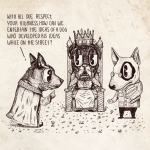Jesus asks a series of questions about who John is, about what people were expecting from him. Did they go into the wilderness to see reeds shaken by the wind? Or a man in soft clothing? Or a prophet? The answer to the second is clearly No: John is not a man in soft clothing; he is not the kind of man found in kings’ palaces. And the answer to the first also seems to be No. John is not... Read more



















